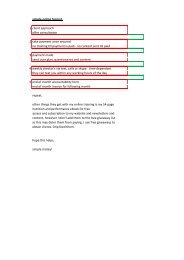Create successful ePaper yourself
Turn your PDF publications into a flip-book with our unique Google optimized e-Paper software.
5. Reverse dieting<br />
What is reverse dieting?<br />
There are predominantly two reasons to reverse diet;<br />
1. When the human body has been in a calorie deficit for too long, or has been in <strong>and</strong> out of<br />
unhealthy diets repeatedly, leaving metabolic damage <strong>and</strong> hormonal imbalances<br />
2. When someone has reached the end of a fat loss program (cut) <strong>and</strong> they need to reverse<br />
diet back to a healthy calorie intake avoiding to much fat increase i.e. stage prep<br />
(competing)<br />
What reverse dieting means is that we need to start to slowly increase the calorie intake using<br />
healthy <strong>and</strong> nutrient dense food to help the metabolism regain full health. When this happens, we<br />
can expect to see a faster working <strong>and</strong> more efficient metabolism <strong>and</strong> the endocrine system<br />
functioning correctly.<br />
Why slowly? Because we want to make sure the metabolism can keep up <strong>and</strong> keep utilising the extra<br />
calories as energy <strong>and</strong> not store too much as fat.<br />
Remember the body does not want to be in a huge calorie deficit or surplus. Its unhealthy <strong>and</strong> too<br />
challenging. The body will down- regulate <strong>and</strong> begin to shut down. It needs to be in a healthy state<br />
of energy balance (as we discuss later). Yoyo dieting has <strong>and</strong> always will be inefficient. So, when<br />
you embark on a fat loss program we still need to remember to fuel the body as best we can. As I<br />
described earlier, when you increase or decrease calories it must be at an efficient amount. Small<br />
steps are going to give the best results.<br />
If you have been on a seriously low calorie diet for some time the metabolism <strong>and</strong> the hormones will<br />
down regulate to store the fat it needs to survive. However eventually the body will give up <strong>and</strong><br />
binge eating inevitably takes place. What happens? More fat is stored because the influx in food is<br />
too much for your slow metabolism to take on <strong>and</strong> convert to energy, resulting in more fat than you<br />
had when you started the diet. Repeat this time <strong>and</strong> time again <strong>and</strong> the results become catastrophic.<br />
Your goal was to get thin. By using a restrictive diet the results you have achieved means you are<br />
fatter than when you started. Simply because you haven’t been allowing the metabolism to keep up!<br />
What is the endocrine system?<br />
Endocrine system: This is a network of gl<strong>and</strong>s in the human body that secrete hormones directly<br />
into the circulatory system to be sent to the target organs. These gl<strong>and</strong>s are the pituitary gl<strong>and</strong>,<br />
pineal gl<strong>and</strong>, thyroid gl<strong>and</strong>, adrenal gl<strong>and</strong>s, pancreas, ovaries <strong>and</strong> testes.<br />
Hormones: A chemical that is made in the body that gets transported by the blood or other bodily<br />
fluids to cells <strong>and</strong> organs to cause some action or to have a specific effect.<br />
Simply put, when the metabolism slows down due to being in a state of starvation, this directly<br />
affects the hormones in your body, damaging them <strong>and</strong> making them work inefficiently. All these<br />
gl<strong>and</strong>s need to be functioning to send the correct hormones to the correct bodily organs. If it can’t<br />
do so, then the body will run inefficiently. Hence why some people, despite being in a low calorific<br />
state, still can’t move fat stores.<br />
19




